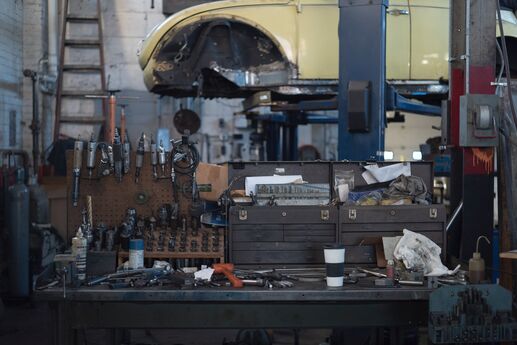
Anyone who loves to tinker knows that having the right automotive tools for the job makes all the difference. Unfortunately, home mechanics rarely have access to niceties such as a car hoist or an air compressor. Still, it’s possible to perform basic DIY auto repair at home as long as you have the correct mechanic tools. With that in mind, here’s my list of the top 11 absolutely essential automotive tools for at-home auto repair.
1. Floor jack and jack stands
Often sold together as a set, a floor jack and a set of jack stands are your first step in getting your car off the ground and ready to be worked on. A good automotive floor jack will be built on wheels, to easily slide under the car.
2. Oil drain pan
This one’s a real no-brainer. You need to contain oil and coolant when you drain them from an engine, so be sure to have something appropriate on hand. A good drain pan is fairly inexpensive, and is far better than trying to use some random container you found around the house.
3. Wrenches
Start with a good basic set of medium-length wrenches with one open end and one closed end. Before you buy, find out whether your car is built standard or metric, because there’s nothing worse than having a bunch of wrenches that don’t quite fit. Ratcheting wrenches are worth the extra money as your collection grows, but I always recommend starting with the basics.
4. Ratchet and socket set
This is another category that you’ll likely end up building on over time. A good ⅜ inch drive ratchet set will be big enough to tackle most nuts and bolts. If your ride is something larger (like a truck), you may want to consider a ½ inch drive set, as well. Most starter sets come with regular-length and deep sockets — both of which will come in handy, depending on what you’re tearing apart. If you plan on getting into some interior and trim work, a ¼ inch drive set will also be handy.
5. Screwdrivers
Another obvious call. But remember, not all screwdrivers are created equal. A good set will include a few sizes and lengths of Phillips and slotted screwdrivers. Depending on where your car or truck is made, some Torx screwdrivers may also come in handy. You’ll never see a Robertson screw on a car unless someone other than the factory put it there. So unless they are needed for other projects, I’d avoid them altogether for DIY auto repair.
6. Oil filter wrench
Oil filter wrenches come in a wide variety of shapes and sizes, so always have a good look at your oil filter before picking one up. Some technicians favor the strap-style wrench that wraps around the outside of the screw-on filter. I often prefer the plier-style ones which guarantee a good grip no matter how tight the filter is screwed on.
7. Torque wrench
The torque wrench is often forgotten in backyard projects, yet it’s one of the most important automotive tools you can buy. Nearly every bolt has a specified torque it’s designed to be tightened to, and it’s always advisable to maintain that specification. Depending on how much you plan on doing, your best bet is to find one that will go up to at least 100 lbs/ft.
8. Pliers
Pliers are a bit of a no-brainer when it comes to automotive tools, and as a general rule, the more kinds you have, the better off you are. Keep an eye out for sets that include both needle-nose and bent needle-nose pliers, as those are the ones most likely to come in handy when something is just out of reach.
9. Pry bars
One of the mechanics tools most overlooked by rookie mechanics, a good set of pry bars goes a long way. Whether you’re separating suspension components or trying to nudge something out of the way to access a bolt, a pry bar is the perfect thing for the job.
10. Swivel socket adaptors and extensions
OK, I’ll admit this is a two-for-one, but both are crucial additions to your socket and ratchet set. With each passing year, less and less thought is put into a car’s bolt access. But with the right length extension and a swivel on the end for a better angle of approach, you can expect to do a lot less cursing under the hood.
11. First aid kit
While a first aid kit isn’t the first thing someone thinks of when they’re talking automotive tools, it’s still a very important part of DIY auto repair. If and when something goes wrong, the last thing you want is to have to trek through the house with an open wound. So be sure to keep at least a basic first aid kit nearby.
